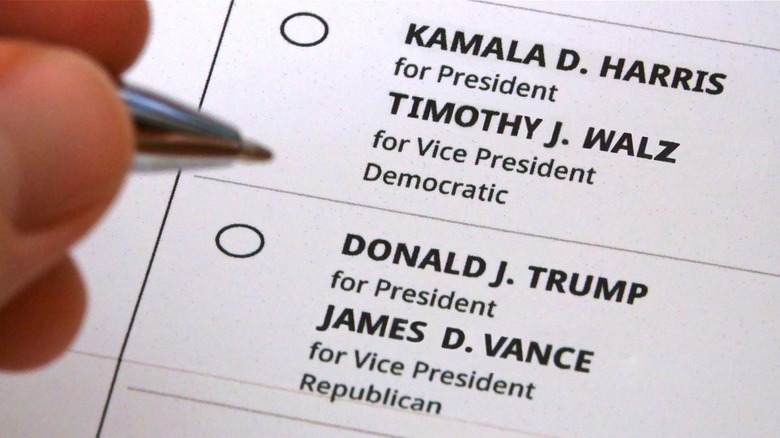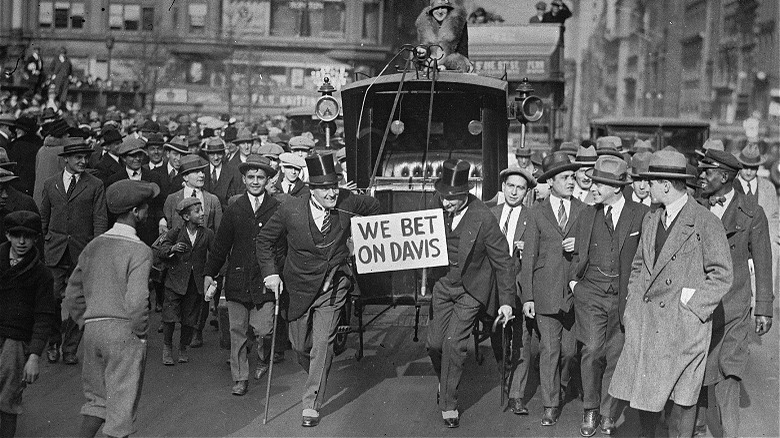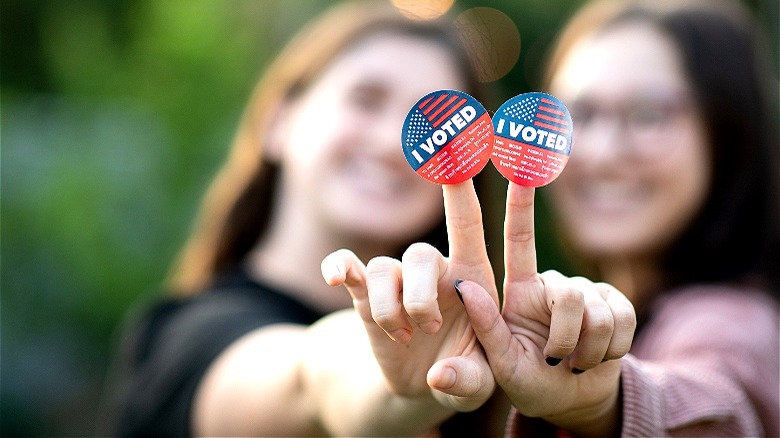You Might Soon Be Able To Bet On The Presidential Election
While many Americans today are already partaking in the entertaining, if problematic, world of sports betting, politics might soon face the same treatment. On September 6, a federal judge sided with Kalshi, a predictive-market startup based in New York, regarding its potential contracts for investor wagers on elections (specifically which political party might take control of Congress in November). This stemmed from an earlier 2023 action, in which the Commodity Futures Trading Commission blocked Kalshi's congressional-control contracts. However, the Friday decision found the CFTC's move to be an overreach. As for how this case relates to the larger picture, the judge's ruling means that the door is now open for legal wagering on the outcome of the U.S. election.
However, it's worth noting that this is not necessarily a guarantee of immediate legalized election betting. The CFTC maintains its stance that election gambling is fundamentally against the public interest because it could coerce traders to vote based on which candidate will make them the most money in their wager. Similarly, by offering politically focused contracts, traders are essentially participating in a form of gambling, which is illegal under financial market federal laws.
In an emergency motion filed Friday, the CFTC said, "At a time when distrust in elections is at an all-time high, even a short listing of [Kalshi's] contracts ... could harm public perception of election integrity and undermine confidence in elections." Legalizing election betting could be an especially concerning element to add to the 2024 race considering the volatility that already exists over past partisan claims of election tampering and fraud.
Has election wagering always been illegal?
You might be surprised to learn that election wagering was hugely popular in the United States up until World War II. While election bidding took place since the inception of the country, organized markets began to form dating back to Abraham Lincoln's presidency. Most of these election markets sprung up in the country's major cities, with New York being the largest hub. The 1916 election is considered the high point of the election-betting market, with the 2024 equivalent of $288 million worth of wagers placed just in the New York markets alone.
Plus, these markets were often correct in their predictions, serving as a predictive poll long before more scientific polling strategies were introduced in the 1930s and 1940s. In fact, according to the paper "Historical Presidential Betting Markets," published in the Journal of Economic Perspectives in 2004, the election market's mid-October betting favorite won 11 out of 15 times over a 56-year period between 1884 and 1940, a success rate of 73%.
As more scientific polling data took over the predictive-election process, and anti-gambling laws increased in major markets, like New York, interest in election betting died out. However, as you have more than likely seen during election years, surveys, polling data, and predictive-market data have become fundamental elements of the preelection process, as every major news outlet attempts to accurately predict the outcome of the election. The use of nonpartisan market analysis offers the same kind of nonpartisan data that was once a staple of the election-gambling markets. In many ways, our modern polling owes its origins to the original election-gambling markets.
What's next for election betting?
It's important to realize that event contracts, like the ones Kalshi is trying to offer for U.S. election outcomes, already exist in the United States, and are already used to place wagers on things like the Super Bowl, awards shows, and even climate change-fueled disaster events. In this way, it's a harder argument to separate elections out from markets that already wager on large-scale events. This is part of why traders have been so heavily lobbying for the ability to place these kinds of wagers on the elections.
What's more, offshore platforms like Polymarket, a decentralized crypto-based prediction market, have been gambling on the outcome of U.S. elections for years to great financial success. Already, bettors have wagered millions on the outcome of the November election through Polymarket, which is leaving many U.S.-based traders feeling left out. As investors push harder for the option to place bets, and other countries expand their legalized election betting, it could become more difficult for the Commodity Futures Trading Commission to maintain its position on legalization.
As for the Kalshi case, the judge has still yet to issue their full opinion and the court granted the CTFC's request for an emergency stay on the decision, with a hearing scheduled for September 12. While it remains to be seen if legal betting will happen ahead of the November 5 election, Kalshi seems confident. First thing Monday morning, its homepage read, "Election markets are coming! Election markets are now legal for the first time in 100 years."


